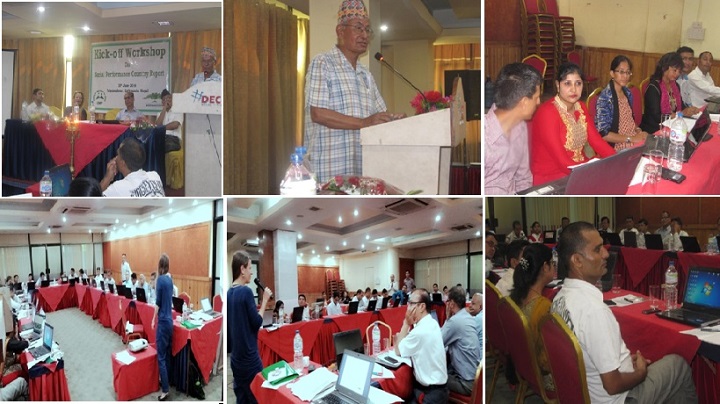Summary Report of Social Performance Kick-Off Workshop
The dawn of 10th June 2016 saw most of the members of Center for Microfinance [CMF], Nepal assembled in the DECC hall, within the premises of the World Trade Center, Tripureswor - each one busy managing stuffs in the right order because the Social Performance country report kick-off workshop, was just an hour away to begin. A total number of 40 participants, including representatives from 27 MFIs and 13 from other institutions attended the workshop.
Amidst the presence of distinguished personalities like Dr. Binod Atreya - head of the Micro Finance Promotion and Supervision Department of Nepal Rastra Bank; Mr. Ganesh Bahadur Thapa - Ex-governor of NRB and the Chairperson of CMF Board of Directors; Ms. Katarzyna Pawlak - Deputy Director of MFC, Poland and resource person for the workshop; and Dr. Harihar Acharya - Chief Executive Officer of CMF, the workshop formally began at 8:00 am. The workshop was jointly inaugurated by the distinguished guests and a representative from among the participants by lighting a lamp with five wicks representing the values of integrity, service, peace, love and non-violence. The inauguration session concluded with thoughtful speeches from the eminent guests and personalities on the main challenges confronting the microfinance industry in Nepal, the contribution that Social Performance Management can make to address these challenges, and the role that CMF plays to strengthen the capability of MFIs in Nepal in social performance and other areas. The speakers briefly introduced the six dimensions of SP management consisting of: (1) Define and monitor social goals, (2) Ensure Board, management and employee commitment to social goals, (3) Treat clients responsibly, (4) Design products, services, delivery models and channels that meet clients' needs and preferences, (5) Treat employees responsibly, (6) Balance financial and social performance.
The floor was then passed on to the resource person, Ms Katarzyna, for delivering the contents planned for the workshop. Following the introduction of participants, the resource person highlighted the objectives of the workshop, key features of the SP Fund, and the opportunities for networks and MFIs. According to her, the MFIs could access offline and online assistance to fill the SPI4 format, through webinar as well as technical assistance from CMF.
The brief introduction of SPI4 tool was followed by a practical exercise on some of its dimensions by the participants in order to incorporate the conditions reflected in the case study of Happy Microfinance. The participants received assistance during this exercise from Ms. Katarzyna and qualified CMF staff members. After the tea break, the entire session was dedicated to the benefits of country report development which demanded active involvement and participation of the members. The discussion and role-play covered the areas like: what information should we collect and provide in the country report, how this information could help both internal and external development of the organization, who to engage and how to organize different sections in the report.
The workshop concluded after the participants agreed and committed to submit the filled in SPI4 by the end of Shrawan 2073 (mid August 2016) on behalf of their respective organizations.

